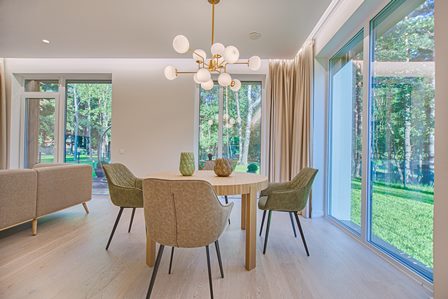
Feng Shui theory has some basic qi flow principles regarding the air currents which pass between doors and windows, but many consumers and novices misinterpret these principles. The shortest distance between two points may or may not be a straight line, but when there is an exterior door aligned directly with another exterior door, this can end up being a house where it is harder to save money. The concept is that the qi flow is unimpeded and will pick speed, escaping the structure before sufficiently nurturing it. Strange but true!
Why is that? Mysterious as it may seem, qi (pronounced “chee”) can affect our health and our ability to save our monetary gains. A house with two doors directly aligned can be seen as an easy leak of the qi. If it escapes the house too quickly, the occupants can’t hang onto it long enough, to dwell in the incoming qi and prosper.
Where this principle gets distorted or misinterpreted includes the following: Firstly, we are referring to exterior doors and not the direct alignment of interior doors. If you have two bedroom doors that are aligned directly across the hallway, this is not the same leaking of qi. As well, if one of the exterior doors is not used much, then its direct alignment with another door or window is nearly a moot point. A common example of the actual problem is the house where the front door is aligned directly with a set of French doors or a slider door leading to the backyard. But when the occupants enter through their garage 90% of the time, then this design flaw is not such a big deal.
It is the door-to-door alignment which is the worst case scenario; however, an exterior door aligned directly with a window can be a secondary problem. Even if it is a window which does not open, a window is more porous than a solid wall. The energy goes through walls like wi-fi, so the thicker the wall or the sealed window, the less of a problem this is. With closed doors, the qi can still escape through the space around the door frame as it travels along walls.
If a bed is aligned with the bedroom door and a bedroom window, this is not ideal and could contribute to sleep problems, but it is in a different category entirely from the exterior door to window alignment.
Direct door-to-door or window alignments are not reasons to panic or move out of the house. This is a fairly easy fix and any number of objects can be used to buffer or re-direct the flow of air currents. Live plants and water features can re-direct the qi and they do not even have to be positioned exactly in line with the doors. Hanging lighting fixtures can slow down the path of qi on the upper level of a room and most other furniture, such as couches or chairs can slow down the path of qi on the lower level. Window treatments, such as shutters and drapes can also help halt the qi (air currents) from escaping through the windows.
This is all common sense and it goes without saying that you don’t want to install one solution which will cause a different problem. For example, having a standing screen between two exterior doors can be effective, as a faux wall, but should not be used if it is going to make a room look and feel awkward, make the room feel congestive or dark. It is also essential to open windows on a regular basis to bring in fresh air.
Author: Kartar Diamond
Company: Feng Shui Solutions (R)
From the Architecture & Design Series
